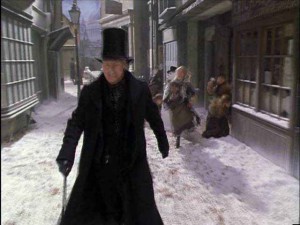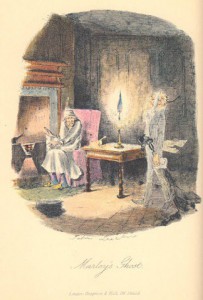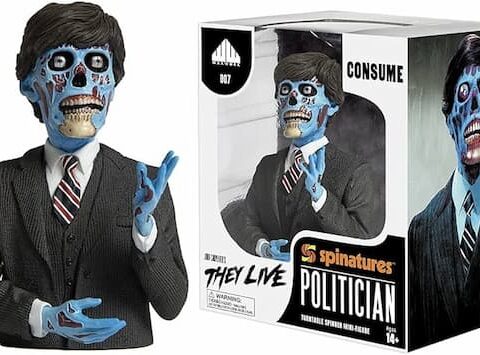Every few Christmases, I tend to re-read Dickens’ A Christmas Carol, as the book has always had a hold on me ever since I first read it as a child.
When I read it as a child, I had no real social conscience or understanding, of course – I simply enjoyed it as a Christmas story. As time has gone on, however – and particularly in the last several years – it has become more obvious how socially and morally relevant Dickens’ story still is.
It was reinforced again a few days ago when I was walking down my nearest high street.
The shops were really busy, the streets were crowded and there were Christmas lights and stuff everywhere. But there was a particular point at which I had a vivid moment of perceptual clarity, where it freshly occurred to me just how unmeaningful and fake so much of this milieu was.
Pretty much every element of the environment was simple commercialism and consumerism. People rushing into stores, rushing out with Christmas shopping, bumping into each other, getting annoyed with people in their way, while all the lights and decorations in shop-fronts were basically just a scam to remind everyone to associate the ‘season’ with the need to shop.
At the same time, I counted at least four separate beggars or homeless people on the route. One of them was an old dude, freezing his arse off – literally rubbing his hands together repeatedly and blowing through his lips. Another was a woman, approximately in her late twenties or early thirties. Three of the four, from what I could discern, were probably migrants or refugees.
The woman, in particular, created a vivid impression in my mind. Because she wasn’t verbally asking any passers-by for money and didn’t even have a cardboard sign or anything. She was just sat there, outside a very busy store, virtually inanimate, her face downcast. She did make eye contact with people as they passed, but her body hardly moved at all. Festive music was audible from within the store. And people were streaming in and out of the brightly lit store, usually coming out with bags of purchases, and virtually every single one of them either didn’t notice her at all or were deliberately avoiding appearing to notice her.
The worst of it is that there was also a cash machine about six or seven feet to one side of where she was sat: so people were literally withdrawing cash from the ATM right next to her.
It was one of those visual/sensory moments that clarifies how much of a disconnect there is in society, how much of a lack of common empathy. In a broader sense, I see this anyway in things like, for example, how common opinion reacts to something like the refugee crisis – with a total absence of compassion.
But sometimes you also see it in that first-hand, visceral sense too. That sense of how much of society has been conditioned to only care about themselves or their immediate interests or immediate networks of people.
Not that I’m any angel in this scenario; I’ve given money or food to beggars or homeless people a number of times, but I’ve also ignored them on lots of occasions too. As I sat to write this article, I actually started wondering why this was – why have I given to some sometimes and yet not to others at other times? I actually couldn’t figure out what the answer is: there must be some, probably subconscious logic to it, but it could just as easily be random.
Of course, this is the case all-year long; but for some reason it registers even more sharply in the Christmas milieu, as does the reality of homelessness.

Dickens, of course, was deeply troubled by some of the same issues and this was evident in most of his writings, with A Christmas Carol being perhaps the most vivid instance.
In fact, the book wasn’t written or conceived just as a nice little Christmas story or work of fiction; it was an act of social conscience, calling on people in Victorian England to remember compassion towards the less fortunate.
It was approaching Christmas 1843 and Charles Dickens was only 31 years old at this time, but was already the most celebrated writer in England. He had at this time been horrified by a parliamentary Blue Book (the term dates back to the 15th century, when large blue velvet-covered books were used for record-keeping by the Parliament), The Second Report of the Children’s Employment Commission. This was the same document that had inspired Elizabeth Barret to write her famous poem, ‘The Cry of the Children’.
It played heavily on the soical justice warrior Dickens’ conscience, and inspired him to action. The genesis of what would later be the most famous Christmas story ever written was actually something much simpler. His initial thought had been to ‘bring about a very cheap pamphlet to the people of England on behalf of the poor man’s child’.
This was literally where the idea of A Christmas Carol came from; Dickens soon decided on ‘writing a Christmas story, the effect of which, in bringing home to the better-off the plight of the poor, especially the children, would be a thousand times more powerful than any pamphlet.’
Having begun in late October, he had already finished it by the end of Novmeber. Chapman and Hall published the story on December 17th, bound in crimson and gold binding and featuring illustrations by the Punch artist John Leech.
By Christmas Eve that year, the publisher told Dickens that the little book was proving so popular that a second printing was already necessary.

Most of my notes here are from Michael Slater’s 1971 Penguin Classics’ The Christmas Books, Volume I.
Lord Francis Jeffrey wrote to Dickens personally, ‘you may be sure that you have done more good in this little publication, fostered more kindly feelings, and prompted more positive acts of benificence than can be traced to all the pulpits and confessionals in Christendom…’
Dickens didn’t actually make much personal profit from the success of the book, due to legal entanglements with the publisher. But one imagines he was satisfied with the immediate effect of the story, which was to prompt various acts of kindness, charity and benevolence across the country, with people moved to action by his Christmas story. The author himself received countless letters from people, thanking him for his story and detailing how it had pricked at their consciences or prompted them to acts of charity or compassion.
What he couldn’t have known, however, was how long after his own lifetime the story would resonate for, and how it would come to be the standard – both morally and aesthetically – for what the popular perception of ‘Christmas’ would be.
It has been noted by many that Dickens is chiefly repsonsible for many of the idyllic elements of what the idea of Christmas looks like in our minds. The idea, for example, of snow at Christmas is regarded to have come from Dickens’ stories, and this was because, as it happened, there were several Christmases in Dickens’ youth in which – uncommonly – it had snowed; which led him to incorporate the idea of the white Christmas into his stories.
More importantly, the reaffirmation of the importance of the less fortunate, of charity and of ‘good will’, that Dickens’ story embodied was firmly associated with the meaning of the season at a time when ‘Christian values’ were felt to be in incredibly short supply.
Dickens had been a lifelong advocate for the poor and downtrodden, a theme that permeated most of his most famous works. The social conditions in the era he lived in were pretty abysmal, exemplified to many by ‘The Poor Law’, which to most liberal Victorians in England was essentially a criminalisation of the poor.
This, in recent years, has prompted some to ask whether the situation in our modern day is actually really any better than it was in Dickens’ time.
This is a question that, in England, has been most significant in recent years, in which the Conservative government has embarked upon massive welfare cuts and sanctions against the most needy people in society, including the disabled, while lining the pockets of corporations, bankers and wealthy elites.
As little as two years ago, it was reported that we had up to a million people – including families – attending food banks, while during the last Tory government there was an extraordinary spate of reported suicides by people who the government had sanctioned to the point of pretty much starvation.

Had the Ghost of Christmas Future taken Scrooge as far 2016, he might’ve been just as troubled as he was in the fictional 19th century London.
As Jennifer Johnstone notes, in a 2014 article for History is Now magazine; ‘By observing Charles Dickens’ work, what is clear is that poverty is a major theme. Dickens was an outspoken social critic in general, but especially about poverty. Before the birth of Britain’s Welfare State, which aims to support the poor, Dickens sought to help the poor by highlighting the social inequality in his country. In this respect, Charles Dickens was a man ahead of his time. The British Welfare State was founded in 1945, with the aim of providing people with a safety net ‘from cradle to grave.’ Dickens identified the reality of poverty many years before that. He acknowledged that poverty was not the fault of the people who endured it, but rather, the fault of the establishment, including the government. Indeed, I daresay that he would be of the same view today – that poverty is the fault of the government…’
Of course, we can’t deal in absolutes: some poverty is the result of bad life choices or bad circumstances. But what I was really thinking about wasn’t so much the causes of poverty or destitution, but the prevailing attitudes towards them.
In some of Ebeneezer Scrooge’s uncaring or even hostile attitude towards the poor or towards orphans, I always see parallels to how many people today talk about poor people or run-down communities, or – in particular – refugees. So much of the dismissive attitude towards the refugee crisis (not just people in Britain, but across much of Europe) basically amounted to ‘raise the draw bridge, keep out the barbarians’.
In fact, the Matt Damon film Elysium is probably a much better way to re-imagine the refugee crisis: but, even in A Christmas Carol, when the Ghost of Christmas Present complains to Scrooge about the insect on the leaf complaining about his hungry brothers in the dust, it’s difficult not to make the contemporary analogies.
Clearly, Dickens’ little book has stood the test of time and become a work for all eras. Yet, strangely, Christmas Carol has become so ingrained in the culture as an element of Christmas that most people by now only enjoy it as entertainment or just as a seasonal staple – and probably fail to really, meaningfully register the significance of its messages.
Arguably, that’s what happens to most things that become institutionalised – you become so familiar with them that you cease to actually see them for what they are anymore. No doubt, something similar can be argued about Christianity itself, where some of those who use the Gospel tradition the most zealously or most nationalistally or tribalistically are also those who fail to grasp the underlying message or spirit of the books or the story they tell.
In essence, the Nativity story is also something that resonates with the refugee crisis at the most visceral level – literally, a story about a man and his pregnant wife fleeing a hostile regime and seeking somewhere to safely stay (asylum). Meanwhile, the written accounts of Jesus are full of instructions to care for the poor, have compassion for the down-trodden, and respect orphans, widows and outcasts.
But, sorry, I was supposed to be talking about Dickens.
The point, I guess, is that it’s remarkable to note how much society and the world has changed in the massive amount of time separating us from Dickens – and yet noting how much it hasn’t changed at the same time.
There are a thousand things that Dickens wouldn’t recognise about twenty-first century England, it being so removed and so evolved from his time: but, judging by the text and spirit of A Christmas Carol, there are a few things he entirely would recognise.
And he would probably wonder how it is that, in a world so far moved – and so far advanced – from his time, the problems, attitudes and prejudices that he was writing about are still so prevalent.





Bit-a-luck this is, recording the 1951 Alastair Sim film. On TV, as I type. Or here: http://www.dailymotion.com/video/x2c1woo Bingo, the perfect accompaniment.
Thanks.
I like the Alastair Sim version; but I have to say it’s behind both (1) the Muppets version and (2) the Patrick Stewart version for me 🙂
In an era where wages, especially those of low and middle class have frozen, there are so many more families just scraping by. And when a majority of the population is one or two paychecks or a health issue away from disaster, there is a lot less capacity to donate. On a wider note, it is the hidden cost cutting (healthcare, welfare, water/power supplies) that is a serious worry. All the while the rich get richer… the amount of political will to address this will be enormous. I very much hope someone has the chops.
Merry Christmas Bedlam.
Thanks. Merry Christmas Helena.
[quote] And he would probably wonder how it is that, in a world so far moved – and so far advanced – from his time, the problems, attitudes and prejudices that he was writing about are still so prevalent.
And he would realize that only self empowerment can change one’s nature, not religion, not government, certainly not science and technology. As a species we have not evolved mentally or spiritually one iota from Dickens’ day, or Jesus’ day. If anything we have plunged ever deeper into corruption and immorality while calling that “freedom.”
The rise in homelessness during just the last few years is horrifying and the most visible and shameful indictment of this Tory government. In Sheffield I saw no one at all sleeping out on the streets in the city centre for the first two decade I lived here. During my last trip into the centre instead I was stopped four times in the space of just a few hundred yards by people desperate for help. No doubt they had problems at home or with alcohol or other circumstances that led to their current plight but ultimately it was our society that abandoned them. Thank you for sharing your personal thoughts…
Incidentally, I think we have probably all walked past on occasions or completely avoided eye contact with people on the street. This can be as much a matter of fear or embarrassment as of lack of generosity. Because frankly it is hard not to feel guilty even when you want to help – begging is so utterly demeaning and charity feels wrong simply because no matter how good your intentions it makes you unbearably superior. Like Corbyn I just want to end this problem forever. No one should have to beg to survive in modern Britain. The problem of homelessness in the 21st Century is a political one pure and simple.